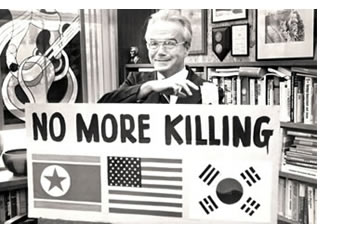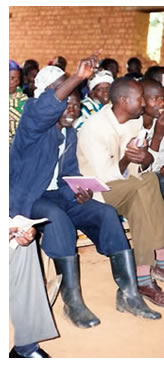
The Story
 In the 21st century the facts and fears of human killing from homicide to terrorism and war continue to haunt humanity. It is the legacy of centuries of bloodshed and traumatizations. Continued killing and preparations to kill threaten human and planetary survival.
In the 21st century the facts and fears of human killing from homicide to terrorism and war continue to haunt humanity. It is the legacy of centuries of bloodshed and traumatizations. Continued killing and preparations to kill threaten human and planetary survival.
Creation of mass destructive weapons immune to defense threatens self-annihilation. Colossal diversion of resources for killing and recovery from killing steals from satisfaction of vital human needs. Cultures that combine victimized lamentation with victorious celebration of killing inhibit recognition of universal human needs for love and happiness. Killing of humans contributes to destruction of the life-carrying capacity of the planet. Continued killing impedes evolution toward local and global cooperation in solving common problems.
But are nonkilling societies and a killing-free world possible? Prevailing pessimism answers, “No!” Killing is inevitable because of human nature, competition over scarce resources, and other factors. However in 2002 a resounding “Yes!” was asserted in Nonkilling Global Political Science published by University of Hawai‘i political scientist Glenn D. Paige. Confidence was asserted on two principal grounds. Nonkilling predominates over killing in human nature. Most humans have not killed and do not kill. Furthermore nonkilling knowledge and practices already exist in global human experience that if creatively combined and advanced in any society promise progress toward making nonkilling societies universally possible.
Responses to the nonkilling thesis in the first decade have been remarkable. The book is being translated into 41 languages accessible to over 4 billion speakers. Over 600 scholars in 300 academic institutions in 73 countries have joined in 19 disciplinary research committees that are contributing to a scientific paradigm shift from acceptance of killing to discover and apply nonkilling knowledge. In 2008 grant support was volunteered by Humanity United to launch the nonprofit Center for Global Nonkilling to advance work begun by its predecessor Center for Global Nonviolence in 1994. Affiliates have spontaneously emerged for nonkilling work in Haiti, Nigeria, DR Congo, Brazil, Germany, India, Balkans, Mozambique, and the Philippines. The website of the Center shares discoveries and invites global participation.
The Center for Global Nonkilling has a unique mission: To promote change toward the measurable goal of a killing-free world in reverence for life. The mission requires discovery and advancing the Spiritual, Scientific, Skill and Arts capabilities of humankind, and focusing them to develop leadership and citizen competence for nonkilling change in every sector of global society.
 The mission requires at minimum a small, creative and catalytic core working group in Hawaii to advance nonkilling research, education-training, and applications of nonkilling knowledge in cooperation with individuals and institutions throughout the world. The model can be replicated for service in every society until each human being becomes a center for global nonkilling.
The mission requires at minimum a small, creative and catalytic core working group in Hawaii to advance nonkilling research, education-training, and applications of nonkilling knowledge in cooperation with individuals and institutions throughout the world. The model can be replicated for service in every society until each human being becomes a center for global nonkilling.
Echoing the UNESCO Charter declaration in 1945 that “since wars begin in the minds of men, it is in the minds of men that the defenses of peace must be constructed,” the Center affirms that “since killing begins in the minds of men and women, it is there that the change toward a nonkilling society must begin.”
The Center mission and organization need unique funding. The unique Center mission requires the understanding of visionary global benefactors. The origin of the unique Manhattan Project that produced the Atomic Bomb provides a powerful analogy. It resulted from a letter from Albert Einstein informing President Roosevelt in 1939 that the science of physics had advanced to a point where creation of a weapon of unprecedented destructive power was possible.
Today it is possible to advise donors and humanity that the Center for Global Nonkilling has demonstrated that knowledge now exists that if creatively advanced and applied can liberate humanity from killing. The challenge to visionary global benefactors and to all whose lives are at stake is to substitute the work of the Center for Global Nonkilling for the Manhattan Project for the security and well-being of all. Nonkilling is the measure of human progress.
